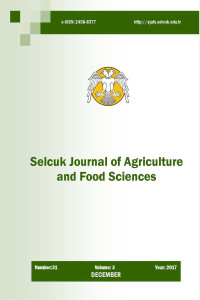Abstract
Plant breeding for resistance to stress factors has become extremely important with the development of new agricultural policies which decrease or prohibit the use of pesticides in agricultural production. The variety number of pear is inadequate, which has high-resistance to fire blight and fruit quality parameters are superior in the World. Laying out the garden with resistant rootstocks and varieties to fire blight is significant because the disease factor could reach to plants in all conditions. When the factor reaches the plant, main struggle occurs in the criterion of plants response. In this study, 15 pear genotypes, which were obtained as a result of different hybridization combinations, were evaluated with their two-year data. Hopeful genotypes were chosen with the weighted ranking method and total scores of genotypes were varied between 425 and 910. As a result of the method formed by the parameters which bring the commercial value of the genotypes to the forefront, 6 genotypes (II-15-61, II-27-21, II-15-75, II-18-21, I-12-3, II-33-34) have been found to have the potential of being registrable and they were transferred to the advanced observation parcels. Superior 6 genotypes, considered to registration, could contribute to pear cultivation.
Details
| Primary Language | English |
|---|---|
| Subjects | Horticultural Production |
| Journal Section | Research Article |
| Authors | |
| Publication Date | December 29, 2017 |
| Submission Date | July 3, 2017 |
| Published in Issue | Year 2017 Volume: 31 Issue: 3 |
Selcuk Agricultural and Food Sciences is licensed under a Creative Commons Attribution-NonCommercial 4.0 International License (CC BY NC).


